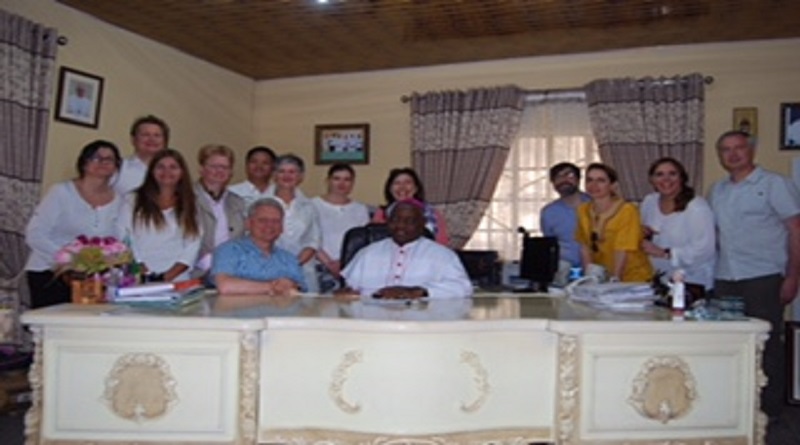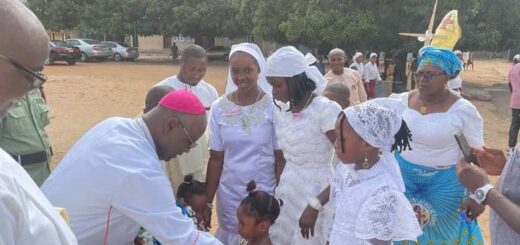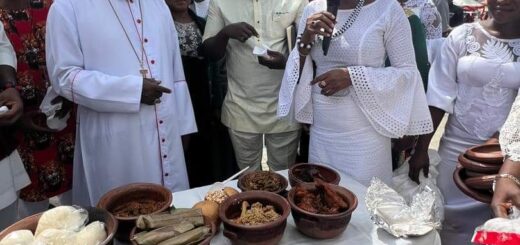From Hosanna to Condemnation: Our Sorrows He Bore
by ARCH BISHOP · March 24, 2024
PALM SUNDAY (THE PASSION OF THE LORD), YEAR B, 24th March 2024, Our Lady Queen of Nigeria Pro-Cathedral, Abuja. Homily by Archbishop I. A. Kaigama.
From Hosanna to Condemnation: Our Sorrows He Bore
Readings: Is 50:4-7; Ps 22:8-9. 17-18a. 19-20.23-24; Phil 2:6-11; Mk 14:1-15:47
Palm Sunday or Passion Sunday is a celebration that ushers us into the Holy Week, a week of deeper reflection on the price that Christ paid for our sins. Today, we commemorate the entry of Jesus into Jerusalem when the crowds greeted Him by spreading their cloaks and palm branches in His path, shouting “Hosanna” (Cf. Luke 19:30-35) as He rode on a donkey.
Palms were a representation of victory, joy, and honor. The entry of Jesus into Jerusalem was a fulfillment of the Old Testament prophecy of Isaiah. He willingly gave Himself up to be mocked and handed over to be crucified. And like a lamb led to the slaughter, He did not complain. The transition from the celebration of Jesus’ entry into Jerusalem, with crowds waving palm branches and singing praises, to His suffering and death, reflects the duality of the event we celebrate today.
The first reading from Isaiah is a prophecy of the suffering Servant of God, while in the second reading from the letter to the Philippians, Paul reminds us of the humility and obedience of Christ: “He emptied himself to assume the condition of a slave and became as men are, he was humble even to accepting death on a cross” (Phil 2:6).
Those shouting “hosanna” saw Jesus as a political messiah who had come to fight their battle, to liberate them from the hands of the Romans. Jesus unmistakably showed the crowds that, He was the expected Messiah, not a political messiah, who has truly come to liberate them from the bondage of Satan. He instructed His disciples to go into the village to find a colt tied, on which no man had yet sat, loosen it, and bring it to Him (cf. Nm 19:2; Dt 21:3; 1 Sm 6:7).
Jesus was entering Jerusalem as that Lamb, of whom John the Baptist said, “Behold, the Lamb of God who takes away the sins of the world” (John 1:29). The sad news here is that, some of those in the crowd, who hailed Christ with the shout of “hosanna,” were the same people who later demanded that Jesus be crucified. These events reflect how unfaithful and erratic we can be at times in our relationship with God and with others. Today, we are for Christ, tomorrow, we are against Him; Christ is our friend when we are in difficulty, but our enemy when we are comfortable. It also shows how we relate with one another. Today we are friends, tomorrow we are arch-enemies.
On a day like this, our prayer as priests, politicians, husbands, wives, children, colleagues at work, etc., is that God should forgive our unfaithfulness to Him and our betrayal of one another. The politicians among us who hysterically make promises during their political campaigns, must fulfill them, and not betray the trust of their people.
Dear friends, it is not just enough to feel sorry for Jesus as He suffered, listening/reading the passion narrative, instead, this Holy Week is a moment of sober reflection, a moment to look within and ask ourselves this pertinent question: am I among those who sing Hosanna to the Son of David today, and tomorrow, I join the band to shout, “crucify him, crucify him?” For many of us, when things are going well with us, we are full of praise to God. But when things go sour, we turn our backs on God. We are, today challenged to examine our own lives in the light of the characters in the passion narrative who at one point praised Jesus, and at another, condemned Him. We too, at one time, praise Christ with songs, and at another, pain him with our sins, just like Pilate who declared Jesus as innocent, and the next minute, acted against his conscience by condemning Him to death; or like Peter, weak and cowardly, quick to deny Jesus in the face of challenges; like Judas who betrayed Him; or like Herod who ridiculed Him and the Jewish religious and political leaders who were bent on getting rid of Him.
Dear brothers and sisters, let us draw closer to God, by not living a life of double standards. Whether as spiritual, traditional, or political leaders, we must practice what we call kenosis – self-emptying/self-giving. Let the same mind be in Nigerian leaders as it was in Christ Jesus, who, though, was in the form of God, did not regard equality with God as something to be exploited, but emptied himself, taking the form of a slave, being born in human likeness. Leaders must serve, and not exploit their leadership positions, refusing to “wash the feet” of their people, considering this below their status and dignity.
Today, we must learn too, that there are moments in our lives as Christians when we feel betrayed by God and cry, “My God, my God, why have you forsaken me!” The fact is that God is listening to our cries and can reverse our sorrows and tragedies.
Today, the Church invites us to consider the one who laid down His life so that we might have life and have it to the full. This is a call to Christian religious leaders to realize that it is not enough to own large and expensive church buildings or boast of having established churches everywhere. We are called to be shepherds whose priority is not money or the competition for numerical increase of members, or how luxurious and expensive pastors’ lives must be as proof that they are not serving a poor God. Our primary concern must be to lead our people to eternal salvation. Money, while very helpful, did not play a critical role in Jesus’ ministry and should not be the major determining factor for our ministry.
As we begin the Holy Week, and going forward, even when we pass through the valley of darkness, may our hearts and mouths sing Hosanna to Jesus, and may He save us from falling into desperation and sin.




